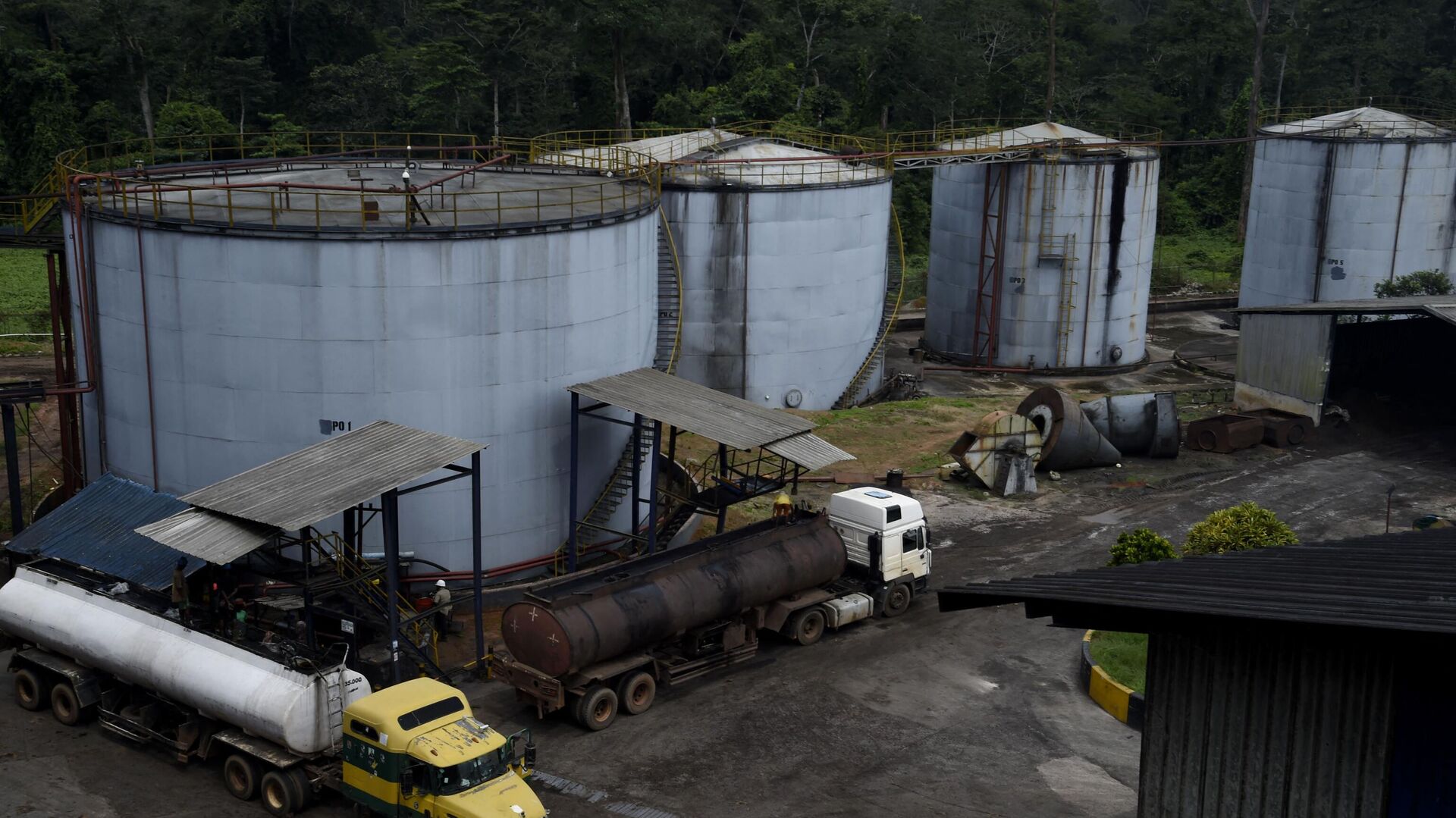https://sputnikglobe.com/20221208/nigerian-lawmakers-call-on-govt-to-accelerate-oil-exploration-for-africas-largest-reserves-1105179148.html
Nigerian Lawmakers Call on Gov't to Accelerate Oil Exploration for Africa's Largest Reserves
Nigerian Lawmakers Call on Gov't to Accelerate Oil Exploration for Africa's Largest Reserves
Sputnik International
This article speaks about lawmakers at the Nigerian House of Representatives calling on the country’s federal government, to unleash the full potential of Nigeria’s hydrocarbon sector through accelerating the geo-physical survey and the seismic data acquisition activities that are taking place in the North Central region of the country in the Bida Basin in Niger State.
2022-12-08T09:46+0000
2022-12-08T09:46+0000
2022-12-08T09:46+0000
africa
west africa
nigeria
oil and gas
strategic oil reserve
https://cdn1.img.sputnikglobe.com/img/07e6/0c/08/1105180946_0:159:3076:1889_1920x0_80_0_0_53c998d79ba907c4c5b80c6e08914cac.jpg
During a plenary session on Wednesday, lawmakers at the Nigerian House of Representatives called on the country’s federal government to unleash the full potential of Nigeria’s hydrocarbon sector through the acceleration of the geo-physical survey and the seismic data acquisition activities that are taking place in the North Central region of the country in the Bida Basin in Niger State.The House argued that the Bida Basin could adjust Nigeria’s oil reserves by some 40 billion barrels by next year, urging relevant federal agencies in the oil sector, including the Federal Ministry of Petroleum Resources, the Nigerian National Petroleum Corporation Limited (NNPC) and Nigerian Upstream Petroleum Regulatory Commission (NUPRC) to conclude the exploration activities launched in the Bida Basin since 2020.Abdullahi acknowledged that Nigeria might become Africa’s first country with the largest oil reserve when the oil exploration activities are finished in Niger State.During the plenary session, the Speaker of Nigeria’s House of Representatives Femi Gbajabiamila directed the House’s relevant bodies to ensure the resolution is complied with.Since the 1960s, Nigeria's economy and budget have been largely depending on the income and revenue from the oil sector. As of 2022, the West African country is considered the second biggest oil producer in Africa after Angola, which has less than a third of Nigeria's oil reserves. Nigeria also ranks second in Africa in terms of petroleum reserves, following Libya, according to the website of Energy Capital & Power, one of the leading investment platforms for the energy sector in Africa.As the world is witnessing an energy crisis amid Russia’ military operation in Ukraine, which prompted Western sanctions against Russian exports, Nigeria, along with some other African countries, have been looked at by the EU as one of the solutions to fill the gap left by sanctions targeting Russia in the global oil market, prompting the African nations to unleash their potential in the Hydro-Carbon industry.In November, Nigeria's Oil Minister Timipre Sylva announced that the country is planning to stop importing oil products and become self-sufficient by 2023. Meanwhile, Nigerian National Petroleum Corporation Limited, a state-owned energy company, started drilling in November for oil and gas in the country's north, marking the first time Nigeria has drilled outside the fossil fuel rich southern Niger Delta.
https://sputnikglobe.com/20221124/nigeria-starts-drilling-for-oil--gas-in-countrys-north-for-first-time-1104625867.html
africa
west africa
nigeria
Sputnik International
feedback@sputniknews.com
+74956456601
MIA „Rossiya Segodnya“
2022
Muhammad Nooh Osman
https://cdn1.img.sputnikglobe.com/img/07e4/08/0e/1080170965_2:0:2050:2048_100x100_80_0_0_1de8233c87df0979e7e74f61b6ffacad.jpg
Muhammad Nooh Osman
https://cdn1.img.sputnikglobe.com/img/07e4/08/0e/1080170965_2:0:2050:2048_100x100_80_0_0_1de8233c87df0979e7e74f61b6ffacad.jpg
News
en_EN
Sputnik International
feedback@sputniknews.com
+74956456601
MIA „Rossiya Segodnya“
Sputnik International
feedback@sputniknews.com
+74956456601
MIA „Rossiya Segodnya“
Muhammad Nooh Osman
https://cdn1.img.sputnikglobe.com/img/07e4/08/0e/1080170965_2:0:2050:2048_100x100_80_0_0_1de8233c87df0979e7e74f61b6ffacad.jpg
nigeria, bida basin, niger state, nigeria oil reserve, the biggest oil reserve in africa, the biggest oil producer in africa,
nigeria, bida basin, niger state, nigeria oil reserve, the biggest oil reserve in africa, the biggest oil producer in africa,
Nigerian Lawmakers Call on Gov't to Accelerate Oil Exploration for Africa's Largest Reserves
Muhammad Nooh Osman
Writer/Editor
In 2022, Angola replaced Nigeria as Africa's largest oil producer, despite the latter ranking second to Libya in terms of crude oil reserves. The Nigerian economy has been largely supported by oil income since the 1960s.
During a plenary session on Wednesday, lawmakers at the Nigerian House of Representatives called on the country’s federal government to unleash the full potential of Nigeria’s hydrocarbon sector through the acceleration of the geo-physical survey and the seismic data acquisition activities that are taking place in the North Central region of the country in the Bida Basin in Niger State.
The House argued that the Bida Basin could adjust Nigeria’s oil reserves by some 40 billion barrels by next year, urging relevant federal agencies in the oil sector, including the Federal Ministry of Petroleum Resources, the Nigerian National Petroleum Corporation Limited (NNPC) and Nigerian Upstream Petroleum Regulatory Commission (NUPRC) to conclude the exploration activities
launched in the Bida Basin since 2020.
“The Group Managing Director of Nigerian National Petroleum Corporation responsible for the Frontier Exploration Services in 2020 noted that in-depth Geological and Geochemical studies revealed a strong presence of hydrocarbon-bearing indicators confirmed as oil and gas-bearing formations,” said the sponsor of the motion Saidu Musa Abdullahi, the House member representing Bida/Gbajo/Kacha federal constituency of Niger State.
Abdullahi acknowledged that Nigeria might become Africa’s first country with the largest oil reserve when the oil exploration activities are finished in Niger State. “The House acknowledges that the discovery of oil in another region of Nigeria is good news for the country’s energy sector and that if the volume of oil in the Bida Basin is established and exploration activities commence fully, Nigeria may, in the near future, overtake Libya, the country with the largest oil reserve in Africa,” the lawmaker said.
During the plenary session, the Speaker of Nigeria’s House of Representatives Femi Gbajabiamila directed the House’s relevant bodies to ensure the resolution is complied with.
Since the 1960s, Nigeria's economy and budget have been largely depending on the income and revenue from the oil sector. As of 2022, the West African country is considered the second biggest oil producer in Africa after Angola, which has less than a third of Nigeria's oil reserves. Nigeria also ranks second in Africa in terms of petroleum reserves, following Libya, according to the website of Energy Capital &
Power, one of the leading investment platforms for the energy sector in Africa.
As the world is witnessing an energy crisis amid Russia’ military operation in Ukraine, which prompted Western sanctions against Russian exports, Nigeria, along with some other African countries, have been looked at by the EU as one of the solutions to
fill the gap left by sanctions targeting Russia in the global oil market, prompting the African nations to unleash their potential in the Hydro-Carbon industry.
In November, Nigeria's Oil Minister Timipre Sylva announced that the country is planning to stop importing oil products and become self-sufficient by 2023.

24 November 2022, 10:39 GMT
Meanwhile, Nigerian National Petroleum Corporation Limited, a state-owned energy company, started drilling in November for oil and gas in the country's north, marking the first time Nigeria has drilled outside the fossil fuel rich southern Niger Delta.




